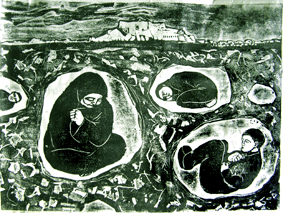The group of those young fellows, calling themselves the members of Orthodox Parents’ Union, claim that they try to defend the public from immorality and save cultural values from annihilation. This is a big group of believers – the members are only Georgians. According to the data, published on the website of orthodox parents’ union, more then 10 000 persons are joined under the same national and religious idea.
Paata Shamugia remembers that time, when he used to receive mail with threats across his e-mail address; when different male voices were calling him with insulting phrases. Even last year the members of the orthodox parents’ union published a letter dedicated to young writers (one of them was Paata Shamugia) in the newspaper “Asaval-Dasavali”, in which they asked to Georgian Orthodox Church to pronounce him an anathema, but the church has ignored the demand.
During the last three or four years it was very common to find critical reviews about contemporary Georgian literature in the literary magazines or newspapers. The concept and even phrases are very similar in every article. “Immorality”, “Perverse”, “Untalanted” became very utilizable words for many Georgian critics and journalists. Also postmodern prose and poetry became an issue of debates and controversy as in virtual space, so on TV and radio.
Besides believers’ group the postmodern literature has the other antagonists, such as a big part of elder, soviet writers’ generation. The “struggle” between age groups and stereotypes set in motion from 1970s, when several poets alternated rhythmic poetry with free verse and inculcated new topics in poetry. Givi Alkhazishvili, one of those “revolutionists”, became scandalous for his erotic and grotesque poem “The Diaries of Katsvia”. Katsvia, as a lyrical hero, belongs to 18th century pre-romantic poet David Guramishvili, but Alkhazishvili has changed his location and epoch and took him in the 20th century as a lover of Russian prostitute Luci.
“Somebody claimed it was a political poem.” he says. “Majority was talking about me very unfavorable things, blaming me in immorality, but small part of our literary public disapproved it. It was my own experiment, accomplished with archetype and, besides, it was a destruction of stereotypes, that had been prohibited us to use erotic metaphors and sexual topics in the work. It was a taboo.”
Alkhazishvili has his classification of modern authors – those, who write for self-popularization and those who write against taboos and care about contemporary art indeed. On his mind, good underground must exist as the mean of unmasking Georgian tabooed society. “Sometimes these so called “rejected” works really haven’t literary values, but problem isn’t erotica or unreligious topics, problem is different, but it is another subject.” – He explains.

"Underground Poetry" by Emily Johns
The contradistinction between writers and believers’ in society escalated after the 19-years-old guy’s literary experiment. On April 15 Erekle Deisadze published his first book, including four short stories, called “Saidumlo Siroba” (“The Fucking Supper”). The title is associated with the Last Supper, from the New Testament. The presentation took place in Ilia’s state university. The author doesn’t deny that his major purpose of his “religious experiment” was to provoke society. The newly-established movement Public Orthodox Movement and Orthodox Parents’ Union made up protested meeting across the university, burning photos of several under-ground poets and also Deisadze’s books and blaming them in depravity and homosexuality.
One of the leaders of Public Orthodox Movement denies the fact of Books’ burning. Baia Amashukeli has her own definition on those literary works’ intention.
“The level of education in Georgia is very poor and the under aged can't analyze what is bad and what not.” She says, “Deisadze’s book has insulted our religion. We are intended to preserve our church and national values.”
For the members of Public Orthodox Movement to be Georgian and orthodoxy are synonyms. They are waiting for that day when Georgian territory would be populated only with Georgian people. (They are waiting for that day as Jewish people are waiting for Messiah.)
For today Erekle Deisadze isn’t in Georgia. In his last interview, published in Georgian newspaper “Kronika”, he mentioned:
“It was the most successful literary debut. I get my deal, I’m popular. The most prestigious publishing house has published my story collection. If believers want me to pronounce on anathema, it would be very ridiculous, because most of all I love Jesus.”
Very good.
ReplyDelete